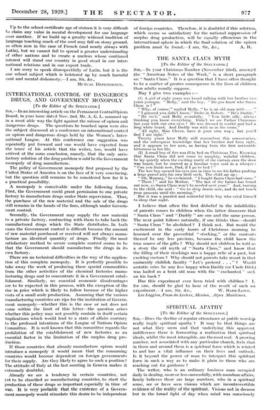THE SANTA CLAUS MYTH [To the Editor of the SPECTATOR.]
SIR,—In your Christmas Number (November 23rd), amongst the " American Notes of the Week," is a short paragraph on " Santa Claus." It is a question that I have often thought to be a matter of greater consequence in the lives of children than adults usually suppose.
May I give two examples :-
(1) A girl of eight years was heard talking with her brother two years younger. ` Molly," said the boy. " Do you know who Santa Claus is ? "
" Why, of course," replied Molly, " he is an old man with " " I guessed you didn't know," broke in Robert. " He's Daddy."
" He isn't,' said Molly scornfully. " You little silly—always thinking you know everything. Didn't we see Father Christmas last year with our own eyes ? He was dressed in scarlet and had a long white beard. And Daddy was with us in the room."
" All right, Miss Clever, have it your own way ; but you'll find I am right."
Twenty years later Molly still remembers this conversation, and the subsequent knowledge that her brother had been right, and it appears to her now, as having been the first noticeable bitterness in her life.
(2) A small boy of five was ill in bed on Christmas Eve. Knowing that Santa Claus did not come to naughty, wakeful children, he lay quietly when the exciting rustle of the curtain over the door was heard, but he started as a familiar voice said in a whisper : " Can you finish now, Dad, if I go to bed ? "
The wee boy opened his eyes just in time to see his father pushing a large parcel into his own little sock. The child sat up :
" Oh, Mummy," he exclaimed. " I fought Santa Claus had come."
" There ! " said his Mother. " The last of the babies has found out now, so Santa Claus won't be needed next year." And, turning to the child, she said : " Go to sleep dearie now, and do not touch your presents until the morning."
But it was a puzzled and sorrowful little boy who cried himself to sleep that night.
I believe that often the first disbelief in the infallibility of parents comes to children when the latter discovers that " Santa Claus " and " Daddy " are one and the same person. The next point follows naturally, if one thinks thus—should " Santa Claus " be abolished ? I think not. But would the excitement in the early hours of Christmas morning be lessened over the proverbial " stocking," or the contents thereof be any less precious, because the child kneW the true source of the gifts ? Why should not children be told as a story the old myth of " Santa Claus," and know that the filling of their stockings was a happy relic of a past, but exciting custom ? Why should not parents take resort in that eminently childish faculty " Let's pretend . . " ? Would ecstatic cries be any less happy when Daddy (or Uncle Dick) was hailed as a bent old man with the " enchanted " sack on his back ?
Has this experiment ever been tried with children ? I, for one, should be glad to hear of the result of such an
































 Previous page
Previous page